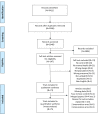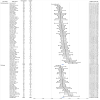Trends in Effectiveness of Organizational eHealth Interventions in Addressing Employee Mental Health: Systematic Review and Meta-analysis
- PMID: 36166285
- PMCID: PMC9555335
- DOI: 10.2196/37776
Trends in Effectiveness of Organizational eHealth Interventions in Addressing Employee Mental Health: Systematic Review and Meta-analysis
Abstract
Background: Mental health conditions are considered the leading cause of disability, sickness absence, and long-term work incapacity. eHealth interventions provide employees with access to psychological assistance. There has been widespread implementation and provision of eHealth interventions in the workplace as an inexpensive and anonymous way of addressing common mental disorders.
Objective: This updated review aimed to synthesize the literature on the efficacy of eHealth interventions for anxiety, depression, and stress outcomes in employee samples in organizational settings and evaluate whether their effectiveness has improved over time.
Methods: Systematic searches of relevant articles published from 2004 to July 2020 of eHealth intervention trials (app- or web-based) focusing on the mental health of employees were conducted. The quality and bias of all studies were assessed. We extracted means and SDs from publications by comparing the differences in effect sizes (Hedge g) in standardized mental health outcomes. We meta-analyzed these data using a random-effects model.
Results: We identified a tripling of the body of evidence, with 75 trials available for meta-analysis from a combined sample of 14,747 articles. eHealth interventions showed small positive effects for anxiety (Hedges g=0.26, 95% CI 0.13-0.39; P<.001), depression (Hedges g=0.26, 95% CI 0.19-0.34; P<.001), and stress (Hedges g=0.25, 95% CI 0.17-0.34; P<.001) in employees' after intervention, with similar effects seen at the medium-term follow-up. However, there was evidence of no increase in the effectiveness of these interventions over the past decade.
Conclusions: This review and meta-analysis confirmed that eHealth interventions have a small positive impact on reducing mental health symptoms in employees. Disappointingly, we found no evidence that, despite the advances in technology and the enormous resources in time, research, and finance devoted to this area for over a decade, better interventions are being produced. Hopefully, these small effect sizes do not represent optimum outcomes in organizational settings.
Trial registration: PROSPERO CRD42020185859; https://www.crd.york.ac.uk/prospero/display_record.php?RecordID=185859.
Keywords: eHealth; employee; mental health; mobile phone; systematic review.
©Elizabeth Stratton, Amit Lampit, Isabella Choi, Hanna Malmberg Gavelin, Melissa Aji, Jennifer Taylor, Rafael A Calvo, Samuel B Harvey, Nick Glozier. Originally published in the Journal of Medical Internet Research (https://www.jmir.org), 27.09.2022.
Conflict of interest statement
Conflicts of Interest: NG has a patent PCT/AU2019/051186 pending. NG and ES own the IP of a web-based disclosure decision aid tool for employees.
Figures





References
-
- Harvey SB, Modini M, Joyce S, Milligan-Saville JS, Tan L, Mykletun A, Bryant RA, Christensen H, Mitchell PB. Can work make you mentally ill? A systematic meta-review of work-related risk factors for common mental health problems. Occup Environ Med. 2017 Mar;74(4):301–10. doi: 10.1136/oemed-2016-104015.oemed-2016-104015 - DOI - PubMed
-
- Glozier N. Mental ill health and fitness for work. Occup Environ Med. 2002 Oct;59(10):714–20. doi: 10.1136/oem.59.10.714. https://oem.bmj.com/lookup/pmidlookup?view=long&pmid=12356935 - DOI - PMC - PubMed
-
- Leka S, Jain A, Iavicoli S, Vartia M, Ertel M. The role of policy for the management of psychosocial risks at the workplace in the European Union. Saf Sci. 2011 Apr;49(4):558–64. doi: 10.1016/j.ssci.2010.02.002. - DOI
-
- Stevenson D, Farmer P. Thriving at Work: a review of mental health and employers. United Kingdom Government. 2017. Oct 26, [2022-10-10]. https://www.gov.uk/government/publications/thriving-at-work-a-review-of-... .
Publication types
MeSH terms
LinkOut - more resources
Full Text Sources
Medical
Miscellaneous

